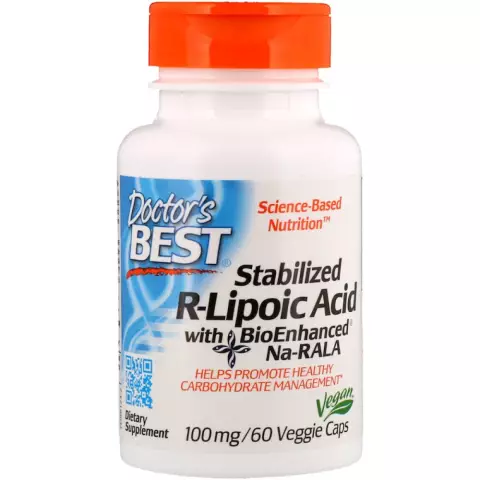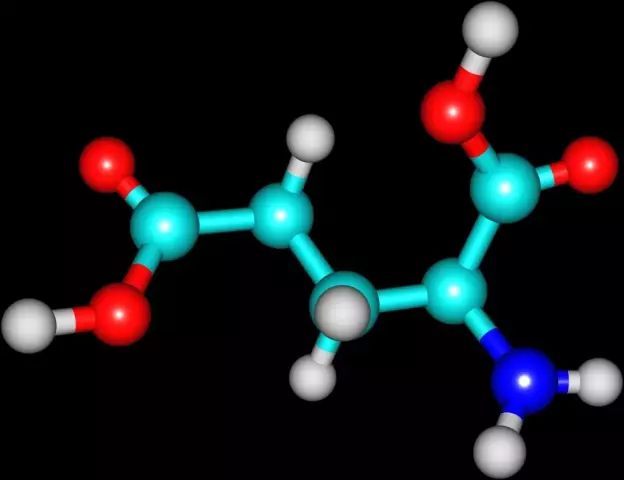- Author Rachel Wainwright wainwright@abchealthonline.com.
- Public 2023-12-15 07:39.
- Last modified 2025-11-02 20:14.
Thioctic acid
Thioctic acid: instructions for use and reviews
- 1. Release form and composition
- 2. Pharmacological properties
- 3. Indications for use
- 4. Contraindications
- 5. Method of application and dosage
- 6. Side effects
- 7. Overdose
- 8. Special instructions
- 9. Application during pregnancy and lactation
- 10. Use in childhood
- 11. Drug interactions
- 12. Analogs
- 13. Terms and conditions of storage
- 14. Terms of dispensing from pharmacies
- 15. Reviews
- 16. Price in pharmacies
Latin name: Thioctic acid
ATX code: A16AX01
Active ingredient: thioctic acid (Thioctic acid)
Manufacturer: OZON, LLC (Russia)
Description and photo update: 2018-24-10
Prices in pharmacies: from 297 rubles.
Buy

Thioctic acid is a metabolic drug.
Release form and composition
Dosage form of Thioctic acid:
- film-coated tablets: round, biconvex, from yellow to yellow-green in color, 600 mg tablets have a risk on one side (10, 20 or 30 pieces in blisters, in a cardboard box 1, 2, 3, 4, 5 or 10 blister packs; 10, 20, 30, 40, 50 or 100 pieces each in polymer cans, 1 can in a cardboard box);
- concentrate for the preparation of a solution for infusion: a clear yellow-greenish liquid with a specific odor (10 ml in an ampoule, 5 ampoules in a blister or tray, in a cardboard box 1 or 2 blisters, or a tray).
Composition of 1 tablet:
- active substance: thioctic acid - 300 or 600 mg;
- auxiliary components: microcrystalline cellulose, lactose monohydrate, croscarmellose sodium, povidone-K25, colloidal silicon dioxide, magnesium stearate;
- shell: hypromellose, hyprolose, macrogol-4000, titanium dioxide, quinoline yellow dye.
Composition of 1 ml of concentrate for preparation of solution for infusion:
- active substance: thioctic acid - 30 mg;
- auxiliary components: ethylenediamine, propylene glycol, water for injection.
Pharmacological properties
Pharmacodynamics
Thioctic or α-lipoic acid has the ability to bind free radicals. Its formation in the body occurs during the oxidative decarboxylation of α-keto acids. Thioctic acid is involved in the oxidative decarboxylation of pyruvic acid and α-keto acids as a coenzyme of multienzyme mitochondrial complexes. In its biochemical action, it is close to the B vitamins.
The drug improves the trophism of neurons, reduces the concentration of glucose in the blood, increases the amount of glycogen in the liver, reduces insulin resistance, improves liver function, and also takes part in the regulation of carbohydrate and lipid metabolism.
Pharmacokinetics
When taken orally, thioctic acid is absorbed quickly and completely. Its maximum concentration in the body is reached in 40-60 minutes. Bioavailability is 30%.
After intravenous administration of the drug at a dose of 600 mg for 30 minutes, its maximum plasma concentration (20 μg / ml) is reached.
The drug is metabolized in the liver by side chain oxidation and conjugation. The drug has the effect of the first passage through the liver.
It is excreted by the kidneys (80-90%), the half-life is 20-50 minutes. The volume of distribution is approximately 450 m / kg. The total plasma clearance is 10-15 ml / min.
Indications for use
Thioctic acid is indicated for alcoholic and diabetic polyneuropathy.
Contraindications
- lactose intolerance, lactase deficiency, glucose-galactose malabsorption (for tablets);
- pregnancy and lactation;
- age up to 18 years;
- increased sensitivity to the components of the drug.
With caution, intravenous administration of Thioctic acid should be carried out to persons over 75 years old.
Instructions for the use of Thioctic acid: method and dosage
Pills
The drug in the form of tablets is taken whole, without crushing or chewing, 30 minutes before breakfast, drinking plenty of water.
The recommended dosage of Thioctic acid is 600 mg once a day.
Taking the tablet form of the drug is started after a course of parenteral administration lasting 2-4 weeks. The maximum course of taking pills is 12 weeks. Longer therapy is possible as directed by a physician.
Concentrate for solution for infusion
The solution is injected intravenously slowly.
The recommended dosage of Thioctic acid is 600 mg (2 ampoules) per day.
Method of solution preparation: dilute the contents of 2 ampoules in 250 ml of 0.9% sodium chloride solution. It is necessary to prepare the solution immediately before the infusion. The prepared preparation should be protected from light, in which case it can be stored for up to 6 hours.
The resulting solution is injected intravenously drip slowly (at least 30 minutes). The course of application of this form of the drug is 2-4 weeks, then you should switch to Thioctic acid tablets.
Side effects
Pills
- Gastrointestinal tract (gastrointestinal tract): nausea, vomiting, diarrhea, heartburn, abdominal pain;
- immune system: allergic reactions (rash, itching, hives); systemic allergic reactions, up to anaphylactic shock;
- nervous system: changes in taste;
- metabolism and nutrition: hypoglycemia (its symptoms: increased sweating, dizziness, headache, visual disturbances).
Concentrate for solution for infusion
- hematopoietic system and lymphatic system: purpura, thrombocytopathy, petechial hemorrhages in mucous membranes, skin, hypocoagulation;
- immune system: allergic reactions (rash, itching, urticaria, eczema), anaphylactic shock, autoimmune insulin syndrome (in patients with diabetes mellitus);
- metabolism and nutrition: hypoglycemia;
- nervous system: violation of taste, hot flashes, seizures;
- Gastrointestinal tract: nausea, vomiting, diarrhea, abdominal pain;
- liver and biliary tract: increased activity of liver enzymes;
- cardiovascular system: pain in the region of the heart, tachycardia (with rapid administration of the drug), thrombophlebitis;
- organ of vision: diplopia, blurred vision;
- local reactions and general disorders: burning sensation at the injection site, local allergic reactions, irritation, hyperemia, swelling.
Rapid administration of the drug can cause an increase in intracranial pressure (passing on its own), weakness and difficulty in breathing.
Overdose
Symptoms of a thioctic acid overdose: nausea, vomiting, headache. When taking from 10 to 40 g of the drug, the following signs of intoxication are possible: generalized convulsive seizures; hypoglycemic coma; violations of the acid-base balance, leading to lactic acidosis; severe blood clotting disorders, up to death; acute skeletal muscle necrosis; DIC syndrome; hemolysis; multiple organ failure; bone marrow suppression.
There is no specific antidote. Symptomatic treatment is recommended. In case of an acute overdose, emergency hospitalization is indicated. Treatment: gastric lavage, intake of activated charcoal, anticonvulsant therapy, maintenance of vital body functions.
special instructions
During the period of therapy with Thioctic acid, you should refrain from drinking alcohol.
Patients with diabetes mellitus need constant monitoring of blood glucose concentration, especially at the beginning of the drug. A dose adjustment of insulin or oral hypoglycemic agent may be required to avoid hypoglycemia. If symptoms of hypoglycemia appear, Thioctic acid should be discontinued immediately.
It is also advisable to stop using the drug in the event of hypersensitivity reactions such as itching and malaise.
Influence on the ability to drive vehicles and complex mechanisms
Thioctic acid does not affect the ability to drive vehicles and other complex mechanisms that require the speed of psychomotor reactions.
Application during pregnancy and lactation
According to the instructions, Thioctic acid is contraindicated for use during pregnancy and during breastfeeding.
Pediatric use
The use of the drug in children and adolescents under the age of 18 is contraindicated.
Drug interactions
An interval of at least 2 hours should be observed when taking thioctic acid with preparations containing metals, as well as with dairy products.
Clinically significant drug interaction of thioctic acid with the following drugs / substances:
- cisplatin: its effect decreases;
- glucocorticosteroids: their anti-inflammatory effect is enhanced;
- ethanol and its metabolites: reduce the effect of thioctic acid;
- insulin and oral hypoglycemic agents: their effect is enhanced.
The concentrate for the preparation of a solution for infusion is incompatible with solutions of dextrose (glucose), fructose, Ringer, as well as with solutions that react with disulfide or SH-groups.
Analogs
Analogues of Thioctic acid are Berlition, Lipoic acid, Lipothioxon, Neurolipon, Octolipen, Polyion, Thiogamma, Thioctacid, Tiolepta, Tiolipon, Espa-Lipon.
Terms and conditions of storage
Store away from light, at a temperature not exceeding 25 ° C. Keep out of the reach of children. Do not freeze.
Shelf life is 3 years.
Terms of dispensing from pharmacies
Dispensed by prescription.
Reviews about Thioctic acid
Reviews about Thioctic acid on the network are mostly positive. Doctors highly appreciate its medicinal properties as a universal neuroprotector and antioxidant, and recommend regular use for patients with diabetes mellitus and polyneuropathies. Many patients, especially women, take the drug for weight loss, but opinions are divided about the effectiveness of thioctic acid in reducing excess weight. There is also a high price of the drug.
Price for Thioctic acid in pharmacies
Approximate price for Thioctic acid tablets, film-coated, for 30 pcs. in a dosage of 300 mg is - 298 rubles; for 30 pcs. in a dosage of 600 mg is 645-690 rubles.
Thioctic acid: prices in online pharmacies
|
Drug name Price Pharmacy |
|
Thioctic acid 30 mg / ml concentrate for preparation of solution for infusion 10 ml 10 pcs. 297 r Buy |
|
Thioctic acid conc. for prig solution for inf. 30mg / ml amp. 10ml 10 pcs. 339 r Buy |

Maria Kulkes Medical journalist About the author
Education: First Moscow State Medical University named after I. M. Sechenov, specialty "General Medicine".
Information about the drug is generalized, provided for informational purposes only and does not replace the official instructions. Self-medication is hazardous to health!






